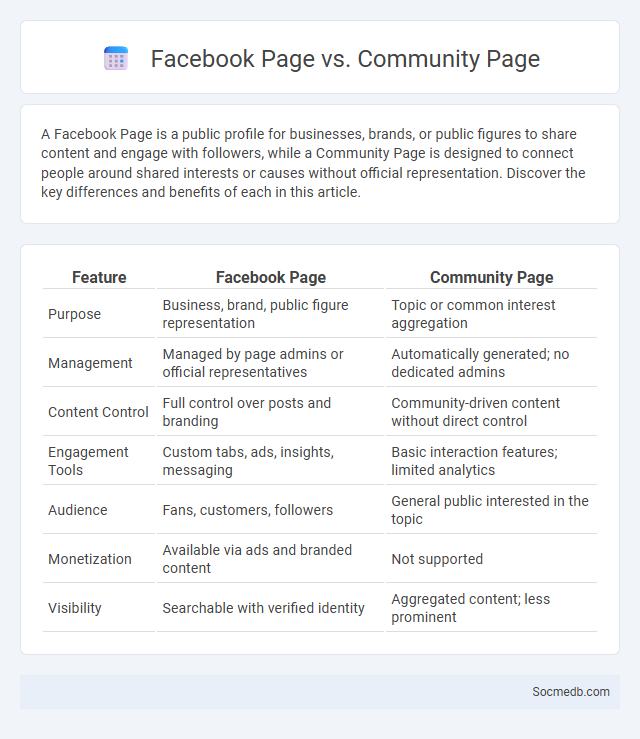
Photo illustration: Facebook Page vs Community Page
A Facebook Page is a public profile for businesses, brands, or public figures to share content and engage with followers, while a Community Page is designed to connect people around shared interests or causes without official representation. Discover the key differences and benefits of each in this article.
Table of Comparison
| Feature | Facebook Page | Community Page |
|---|---|---|
| Purpose | Business, brand, public figure representation | Topic or common interest aggregation |
| Management | Managed by page admins or official representatives | Automatically generated; no dedicated admins |
| Content Control | Full control over posts and branding | Community-driven content without direct control |
| Engagement Tools | Custom tabs, ads, insights, messaging | Basic interaction features; limited analytics |
| Audience | Fans, customers, followers | General public interested in the topic |
| Monetization | Available via ads and branded content | Not supported |
| Visibility | Searchable with verified identity | Aggregated content; less prominent |
Understanding Facebook Page, Community Page, and Personal Page
Facebook offers distinct page types to serve various user needs: a Personal Page is designed for individual users to share personal updates and connect with friends; a Facebook Page functions as a professional profile for businesses, brands, public figures, and organizations to engage with followers and promote content; a Community Page aggregates information about shared topics or interests without a direct owner, fostering collective engagement. Understanding these differences helps optimize social media strategies by targeting the appropriate audience and leveraging specific features like analytics, advertising options, and content visibility tailored to each page type. Effective use of Facebook's page structures enhances brand presence, community building, and personal networking on the platform.
Definition and Purpose of a Facebook Page
A Facebook Page serves as a public profile designed specifically for businesses, brands, celebrities, and organizations to connect with their audience on the social media platform. Its primary purpose is to enhance brand visibility, facilitate customer engagement, and provide a centralized location for sharing updates, promotions, and content. By leveraging Facebook Pages, entities can strategically target and interact with their followers, driving community growth and improving online presence.
What is a Community Page?
A Community Page on social media serves as a centralized hub where users with shared interests, goals, or affiliations can engage through posts, discussions, and shared content. It fosters interaction and connection among members while promoting collaboration and information exchange within the community. This feature enhances user engagement by providing a dedicated space for targeted communication and relationship-building.
Differences Between Facebook Page and Community Page
Facebook Pages are designed for businesses, brands, and public figures to broadcast content and engage with followers, featuring advanced analytics and advertising tools to enhance your marketing strategy. Community Pages, however, are collaboratively managed focuses on shared interests or local communities without the extensive customization or promotional features of Pages. Understanding the functional distinction helps you choose the right platform for building your online presence and fostering interaction.
Audience Engagement: Page vs Community Page
Page and Community Page on social media differ significantly in audience engagement strategies. A Page primarily offers broadcast-style content where the owner controls posts, making it ideal for businesses or brands to share updates and promotions, while a Community Page fosters user-generated content and discussions, encouraging active participation from members. To maximize Your audience engagement, choose a Community Page for building meaningful interactions or a Page for consistent brand messaging.
Features and Tools Comparison
Social media platforms offer diverse features and tools tailored to different user needs, from Facebook's comprehensive groups and events system to Instagram's visual-centric Stories and Reels. Twitter excels with real-time microblogging, trending hashtags, and Spaces for live audio conversations, while LinkedIn prioritizes professional networking through advanced job search filters, endorsements, and publishing options. TikTok's algorithm-driven short videos focus on viral content creation paired with easy editing tools, making it distinct from Pinterest's visual bookmarking and mood board capabilities for inspiration and planning.
Admin Controls and Page Management
Social media platforms offer robust admin controls that empower you to manage user roles, moderate comments, and customize privacy settings effectively. These tools enhance page management by allowing real-time content scheduling, analytics tracking, and audience engagement monitoring. Leveraging advanced admin controls ensures your social media page remains secure, organized, and aligned with your brand goals.
Content Strategy for Each Page Type
Content strategy for social media varies by page type to maximize engagement and reach. Brand pages should emphasize storytelling and customer testimonials to build trust, while product pages focus on high-quality visuals and detailed descriptions to drive conversions. Influencer pages benefit from a mix of authentic personal content and sponsored posts to maintain credibility and attract followers.
Pros and Cons: Facebook Page vs Community Page
Facebook Pages offer businesses robust tools for brand promotion, including targeted advertising, insights analytics, and direct customer engagement features designed to boost visibility and sales. Community Pages, however, focus on uniting users around shared interests or local events, fostering organic interaction and collaboration without commercial intent. While Pages provide structured marketing advantages, Community Pages support grassroots organization but lack advanced business functionalities.
Which Page Type is Best for Your Goals?
Choosing the right social media page type depends on your specific goals, whether it's brand awareness, customer engagement, or direct sales. Business Pages on platforms like Facebook offer tools for advertising, analytics, and customer interaction, ideal for companies aiming to build a professional presence. Personal or Creator Pages are suited for influencers and content creators focusing on community building and content distribution.
 socmedb.com
socmedb.com